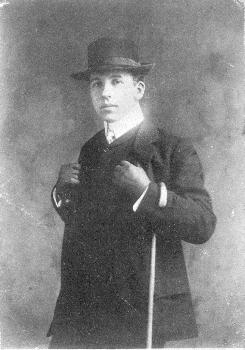Isidore Osselly
He was, after singing "a brilliant season" in Verviers the winter before and a spring season in Chalon-sur-Saône, still very young
when appearing as Rodolfo, Léopold, Gérald and Duca di Mantova in Dijon in October 1908, where he was perceived as less
brilliant, though; in Rigoletto, his rendition of "Comme la plume au vent" (or La donna è mobile) was met with total
silence and no applause at all. A local critic described his voice as small and narrow, but endowed with a good top. His lack of volume
was later chided by several newspapers, his timbre was also called white, nasal and not exactly beautiful. In November and December 1908,
he sang in Faust, Mireille and Le jongleur de Notre-Dame in Dunkerque. In December, he also replaced an indisposed
colleague as Massenet's des Grieux in Amiens – and was a failure.
The season 1909/10 found him in Le Havre, where he was mostly successful; he sang Roméo, Rodolfo, Shakespeare (Le songe d'une
nuit d'été), Jean (Le jongleur de Notre-Dame, Alfredo, Vincent, Edgardo, Georges Brown, Faust, Canio (!), Nadir,
Gérald or Hoffmann.
In January 1911, Osselly was in Auray for Mireille. In spring, he had a contract at the Gaîté-Lyrique in Paris, where
he sang Almaviva and Georges Brown, for instance. During that season, he appeared also in Gent and Narbonne. In summer 1911, he was Don
José and Cavaradossi at the casino in tiny Wimereux. In October of the same year, he jumped in for Maurice Bensa as des Grieux in Reims. In November, Osselly sang Rodriguez (Don Quichotte) and Vincent in
Nancy, where he hoped to get a contract, but he didn't please.
In early 1912, he appeared in Saint-Quentin as Massenet's des Grieux and as Gérald; in March, in Troyes as the title character in
Barbe-Bleue; in April, in Fontainebleau as Gounod's Faust; in November, as des Grieux in Saint-Quentin again. In March 1913, he
was in Saint-Quentin once more, as Don José this time; and in August, he participated in an operatic concert at the casino of
Saint-Lunaire.
After that, further notes on Osselly are completely missing, and you'd get the impression that his career was over. Then, all of a sudden
and just for once, he resurfaces in January 1920 in Namur (in Belgium, which was obviously his native country), where he sang in a series
of privately organized performances: des Grieux, Cavaradossi, Duca and Faust.
References:
I want to thank Georges Cardol for the picture. |
